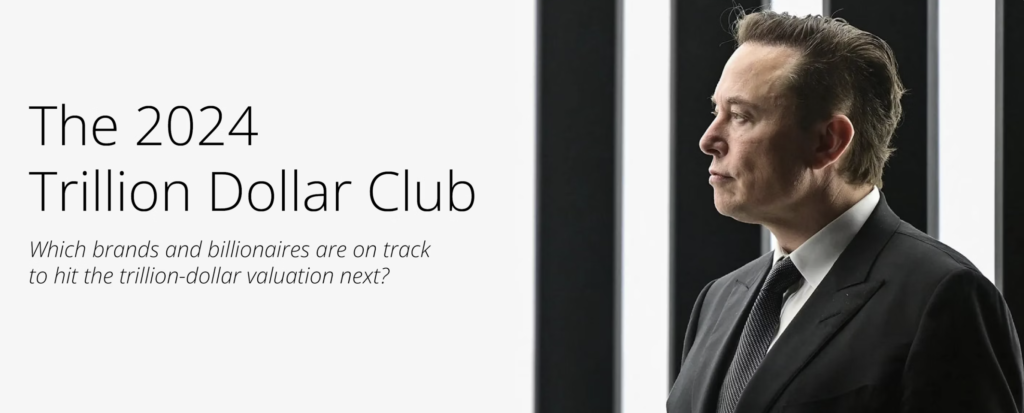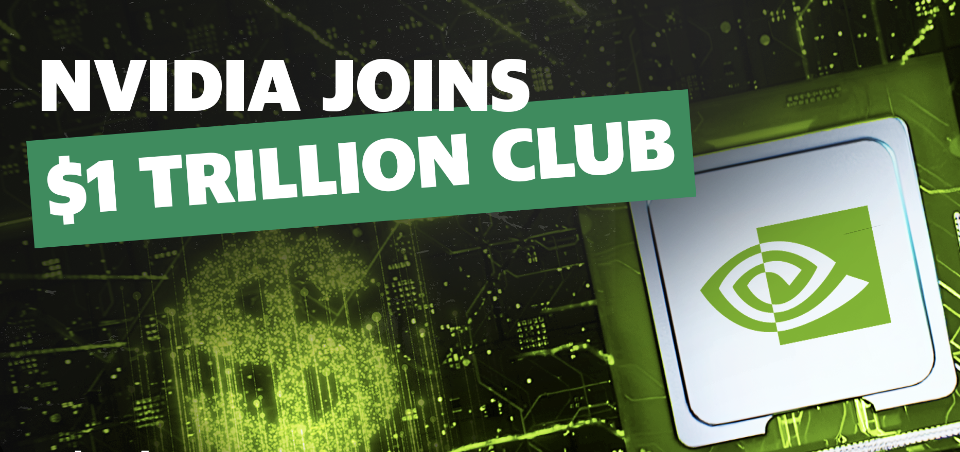The exclusive club of companies with a market capitalisation exceeding $1 trillion has seen dramatic changes lately. These changes are not just numbers; they are seismic shifts that are significantly impacting the future of the tech and healthcare sectors. Buckle up, finance enthusiasts, because we’re dissecting the shakeup!
A new member has joined the trillionaire club
Warren Buffet’s conglomerate Berkshire Hathaway has joined the select circle of companies with a market capitalization of over $1 trillion for the first time. Its value has more than doubled in the last five years, from $133 billion in 2014 to more than $1 trillion today.
Seven US companies now have a market capitalization more than $1 trillion, including Apple, Nvidia, Microsoft, Google, Amazon, Meta, and Berkshire.

Here are the current Members of the Trillion Dollar Club for Would-be Stock pickers!
Microsoft
Market Cap: $3.342 trillion
Founding Year: 1975
Background: Microsoft is the brainchild of a college dropout turned tech visionary, Bill Gates. The software giant has shaped the modern computing world. From its early days, when Gates and Paul Allen wrote the BASIC programming language for the Altair 8800, to the revolutionary Windows operating system, Microsoft has been at the forefront of personal computing. Its rise to a tech titan highlights the profound influence of unwavering innovation and a mission to empower people and businesses through technology. It’s not merely about software; it’s a narrative of evolution, a world-altering odyssey that began as a garage startup and has propelled Microsoft into a global technology leader.
Key Products: Windows OS, Microsoft Office, Azure
Achievements: A strong presence in cloud computing and the acquisition of LinkedIn and GitHub.
Apple
Market Cap: $3.181 trillion
Founding Year: 1976
Background: Far more than just a tech company these days, Apple is an icon of innovation and style. All beginning in a garage and building on the vision of Steve Jobs and Steve Wozniak, it wanted to make personal computers a household item that was accessible to the masses. In the years since, Apple has become iconic with its elegant designs and groundbreaking innovations, which it sells to its loyal, worldwide customer base. From the Macintosh to the iPhone, Apple continually reshapes our interaction with technology. It’s a tale of resilience, creative genius, and an enduring dedication to making technology both aesthetically pleasing and accessible to all.
Key Products: iPhone, MacBook, iPad
Recent Achievements: Unveiling innovative features, including the M1 chip, and expanding their services, such as Apple Music and Apple TV+.

NVIDIA
Market Cap: $3.113 trillion
Founding Year: 1993
Background: NVIDIA’s journey is a testament to the power of graphics. Founded by Jensen Huang, Chris Malachowsky, and Curtis Priem, the company started with a vision to unlock the potential of computer graphics. What began as a pioneer in Graphics Processing Units (GPUs) for gaming has since transcended into an AI and high-performance computing powerhouse. Its GPUs have become the backbone of AI, driving breakthroughs in fields like deep learning. Gaming-wise, NVIDIA’s GeForce GPUs have set the bar for immersive experiences. The company’s relentless pursuit of innovation has not only transformed the gaming world but also elevated its status as a leader in AI, data centres, and autonomous vehicles. NVIDIA’s story is one of innovation, where pixels and polygons paved the way for a brighter, AI-driven future.
Key Products: Graphics Processing Units (GPUs), Data Centre solutions, and Artificial Intelligence (AI) technology.
Recent Achievements: Solidified its position as a global leader in AI technology
Alphabet (Google)
Market Cap: $2.222 trillion
Founding Year: 1998
Background: What began in a Stanford dorm room as a research project by Larry Page and Sergey Brin has since evolved into a tech powerhouse known as Alphabet Inc. Google, a cornerstone of Alphabet, introduced us to the art of internet search and gave rise to a digital revolution. Its ingenious algorithms quickly became part of our daily lives. Beyond search, Alphabet’s reach extends to innovations in cloud computing, Android, and even self-driving cars through Waymo. The reorganisation into Alphabet in 2015 allowed the company to explore various ventures, making it a symbol of relentless curiosity and groundbreaking technology in the digital age.
Key Products: Google Search, YouTube, Android
Recent Achievements: Leading in online advertising, Android’s market dominance, and innovations in AI and self-driving technology.
Amazon
Market Cap: $1.6 trillion
Founding Year: 1994
Background: Created by Jeff Bezos, Amazon began as an online bookstore situated in a modest Seattle garage. Starting from these modest beginnings, it grew into the planet’s largest online retailer, leaving an indelible mark on the way we approach shopping. Amazon’s relentless spirit of innovation has extended well beyond traditional e-commerce. It now includes pioneering services such as Amazon Web Services (AWS), which plays a foundational role in powering a significant chunk of the internet, along with ventures into original content creation through Amazon Prime Video. Its ever-expanding reach even extends into our households through devices like the Amazon Echo. Amazon’s journey is not just a story of retail evolution; it’s a testament to the relentless invention and a visionary commitment to moulding the digital landscape.
Key Products: Amazon.com, Amazon Web Services (AWS)
Recent Achievements: Dominance in e-commerce, expanding into grocery stores with Amazon Fresh and entering the entertainment industry with Amazon Prime Video.
Saudi Aramco
Market Cap: $2.2 trillion
Founding Year: 1933
Background: Saudi Aramco is an energy behemoth with roots dating back to the 1930s when oil reserves were discovered beneath the Arabian desert. What initially started as a joint venture between the United States and Saudi Arabia has blossomed into a cherished national asset for the Kingdom of Saudi Arabia. The journey of Saudi Aramco is intricately woven into the modern history of the oil industry, marked by the establishment of OPEC, significant geopolitical shifts, and evolving energy demands. Boasting coveted oil reserves, it’s more than a mere corporation; it stands as a linchpin of the Saudi economy and a global energy leader. The tale of Saudi Aramco is one of adaptation, unwavering strength, and a pivotal role in shaping the global energy landscape for nearly a century.
Key Products: Crude oil, natural gas, refining, and petrochemicals.
Achievements: A strong hold over the world’s supply of oil
Facebook (Meta)
Market Cap: $1.255 billion
Founding Year: 2004
Background: It all began in a Harvard dorm room when Mark Zuckerberg and his friends created a social platform called Facebook. What started as a way for college students to connect has grown into a global social media giant, rebranded as Meta in 2021. Beyond connecting friends and family, the company has introduced us to a new era of communication and virtual interaction. With acquisitions like Instagram and WhatsApp, Meta has expanded its social media empire. More recently, the concept of the Metaverse has become a focal point, pushing the boundaries of online connectivity. Meta’s journey is a remarkable tale of how a college startup transformed into a company, shaping the future of digital connection and immersive experiences.
Key Products: Facebook, Instagram, WhatsApp
Recent Achievements: Expansion of the Metaverse concept and continued growth in user engagement.
These companies have completely reshaped their own industries and often gone on to dominate other industries they enter. They also impact all our lives, jobs, and the way we interact with the world. Their stories provide valuable lessons on what it truly means to attain the zenith of corporate achievement.
Farewell, Tesla. Maybe?
Unfortunately, Tesla, the electric car pioneer, has been dropped from the trillion-dollar club. This is not just a blip on the radar but a significant event that underscores the inherent volatility of the tech sector and the challenges even the most innovative companies face in maintaining their market value. It’s a reminder that even the most successful companies are not immune to market fluctuations!
The Waiting List: Who’s Next? (and Their Current Market Caps)
- Eli Lilly (The Pharmaceutical Powerhouse): This healthcare giant has been on a tear, developing innovative drugs and benefiting from the ever-growing demand for pharmaceuticals. Its entry would solidify the healthcare sector’s presence in the trillion-dollar club. Eli Lilly’s market cap currently sits at around $840.04 billion. Founded in 1876 by Colonel Eli Lilly, the company has a long history of innovation, creating some of the world’s first mass-produced antibiotics and, more recently, focusing on areas like diabetes and cancer treatment.
- TSMC (The Chip King): Taiwan Semiconductor Manufacturing Company (TSMC) is the world’s leading chipmaker, powering everything from smartphones to artificial intelligence. The global chip shortage has underscored its critical role, making it a strong contender. TSMC boasts a market cap of over $902.22 billion. Founded in 1987, TSMC has become a vital player in the tech industry by focusing solely on chip manufacturing for other companies, allowing them to design their own processors without the burden of fabrication.